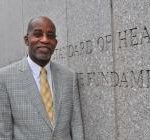Beware of the small slights in life. Over a lifetime they add up to major loss of health, physical and mental, warns David R. Williams, a professor of public health, sociology and African and African-American studies at Harvard University.
For decades Williams has studied the connection between racism and diminished health. Recently his work percolated up in the news as he’s giving a few talks this week, at the invitation of Canadian health experts eager to close the gap between black and white populations there.
Worldwide, life expectancies are all strongly linked to socioeconomic status – job rank, income and education level. Minority populations typically end up on the lower end of the spectrum, and many nations are working to reduce those life span differences, which reach up to 20 years.
Between 1990 and 2008, the United States began making headway in its quest end the difference, with the most educated blacks gaining 6.7 years in life expectancy. But they still lag in lifespan behind their white counterparts, and Williams points to racism, or what he calls “microaggressions,” as the key hidden factor.
To quantify the effects of racism, Williams developed three statistical tools: The Major Experiences of Discrimination, Everyday Discrimination, and Heightened Vigilance scales.
Everyday discrimination, Williams found, extracts the greatest toll. Black Americans often report poor service in retail outlets or being followed as though they’ll shoplift, being passed over for important positions or promotions, and less attentive treatment from health care professionals, among countless slights. (The Tumblr site, http://microaggressions.tumblr.com, has numerous first-hand examples.)
Among the health ramifications: Greater risk of developing heart disease, depression, and premature delivery, as well as the buildup of abdominal fat, itself linked to diabetes, high blood pressure, and stroke.
Awareness starts the cure, Williams asserts. In a recent article in the (Halifax) Chronicle Herald, he advised pausing before subconsciously categorizing somebody based on the most common traits used to discriminate — race, gender and age. Instead, he suggested making a conscious effort to focus on the person as a unique individual.
1) Harvard prof coming to HRM for talks on racism’s effect on health; The Chronicle Herald, Clare Mellor, staff reporter. February 7, 2014.
Suzanne Bohan



